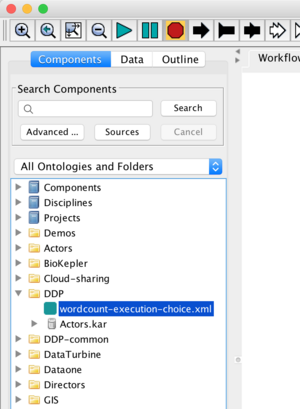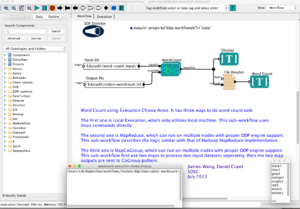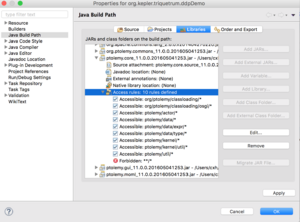Notice: this Wiki will be going read only early in 2024 and edits will no longer be possible. Please see: https://gitlab.eclipse.org/eclipsefdn/helpdesk/-/wikis/Wiki-shutdown-plan for the plan.
Triquetrum/Kepler
This page is a work in progress.
The goal of this page is to illustrate how to use Kepler Scientific Workflow System Actors in Triquetrum.
Note that the Kepler Scientific Workflow System is not the same as the Kepler release of Eclipse. In this page, the term Kepler is used to mean the Kepler Scientific Workflow System.
Contents
- 1 Kepler
- 2 Creating a new Kepler Bundle
- 3 What Kepler classes are necessary?
- 4 Tracking Down Dependencies
- 4.1 _controller cannot be resolved in KeplerGraphFrame
- 4.2 _debugging cannot be resolved in ExecutionChoiceDirector
- 4.3 DDFDirector is needed by ExecutionChoiceDirector
- 4.4 ParameterPort and PortParameter are needed by ExecutionChoiceDirector
- 4.5 org.apache.commons.io.FilenameUtils is missing from ExecutionChoice
- 4.6 ExecutionChoice uses lots of GUI code
- 4.7 Hadoop
- 4.8 ExecutionChoice Revisited
- 5 Providing the ExecutionChoice actor to the run time
- 6 Packaging the plugin(s) for your RCP editor
- 7 Resources
Kepler
The Kepler Scientific Workflow System has actors that we would like to use in Triquetrum. In this case, we would like to use Kepler's Distributed Data-Parallel (DDP) actors.
For a brief overview of DDP, see:
- Ilkay Altintas, Daniel Crawl, Jianwu Wang. A Distributed Data-Parallel Execution Framework in the Kepler Scientific Workflow System. October 16, 2015. Presented at the Eleventh Biennial Ptolemy Miniconference, Berkeley.
The biggest issue with the integration is that Kepler's classes are not set up for OSGi. Triquetrum/Extending Triquetrum discusses how to set up the packages.
Kepler Installation
- See Kepler and Eclipse for how to download and configure Kepler. To get the DDP work, we use the biokepler configuration, so:
mkdir kepler cd kepler svn co https://code.kepler-project.org/code/kepler/trunk/modules/build-area cd build-area/ ant change-to -Dsuite=biokepler ant clean-cache ant eclipse
- Import the Kepler projects into the same workspace as to where Triquetrum is set up
- Create a Kepler Run configuration an run it:
- project: biokepler
- main class: org.kepler.Kepler
Kepler Fails to start: ProvKAREntryHandler$Factory
If, during startup, we get this message:
java.lang.ClassNotFoundException: org.kepler.kar.handlers.ProvKAREntryHandler$Factory at java.net.URLClassLoader.findClass(URLClassLoader.java:381) at java.lang.ClassLoader.loadClass(ClassLoader.java:424)
The solution is to select use the biokepler project, not the kepler project.
Run the DDP demo
Kepler will start up. Close the splash window and under Components, double click on DDP and then wordcount-execution-choice.xml. Below is a screen shot of the initial Kepler window:
The wordcount demo has multiple ways of counting words. The default way is to use Unix commands.
Below is a run that counts words using Unix commands:
To use the other ways of counting words, double click on the Word Count actor and change the Choice parameter.
Our first goal is to get Kepler running and count words using Unix commands.
Creating a new Kepler Bundle
- Create the plug-in,
- In Eclipse: File -> New Plug-in Project
- In the dialog, set the Project Name: to org.kepler.triquetrum.ddpDemo
- Click Finish
- In the org.kepler.triquetrum.ddpDemo package, update MANIFEST.MF:
Import-Package: org.apache.commons.lang;version="2.6.0", org.osgi.framework;version="1.8.0", org.ptolemy.classloading;version="11.0.0", org.ptolemy.classloading.osgi;version="11.0.0", org.ptolemy.commons;version="11.0.0", ptolemy.actor;version="11.0.0", ptolemy.actor.gui;version="11.0.0", ptolemy.data;version="11.0.0", ptolemy.data.expr;version="11.0.0", ptolemy.data.type;version="11.0.0", ptolemy.gui;version="11.0.0", ptolemy.kernel;version="11.0.0", ptolemy.kernel.util;version="11.0.0", ptolemy.moml;version="11.0.0", ptolemy.util;version="11.0.0" Export-Package: org.kepler;version="1.0.0"
- Create the p2.inf file (See Creating an actor bundle)
- Open the org.eclipse.triquetrum.workflow.actor.plot project, click on META-INF, highlight the p2.inf file and select copy
- In the org.kepler.triquetrum.ddpDemo project click on META-INF and paste
- The p2.inf file will be created.
What Kepler classes are necessary?
FIXME: It turns out that doing the steps below is probably not the right way to add actors. Instead, a better way is to add each actor and the classes the actor depends on
The next step is to determine what Kepler classes are necessary.
The demo primarily uses org.kepler.ddp.actor.ExecutionChoice, which is a composite actor that contains submodels that implement the different ways the actor can be executed.
The -verbose option of the java command will report what classes are loaded.
Unfortunately, it seems that adding -verbose to the run configuration in Eclipse does not report the Kepler classes that are loaded, so we use the command line
To run the model without the UI from the command line
cd kepler/build_area ant run -Dworkflow=../ddp/workflows/demos/wordcount-execution-choice.xml
Edit kepler/build-area/src/org/kepler/build/Run.java and insert the following into the runSuite() method:
java.createJvmarg().setLine("-verbose");
Compile the build system:
ant -f kepler-tasks.xml
Run the model and save the output to a file:
ant run -v -Dworkflow=../ddp/workflows/demos/wordcount-execution-choice.xml >& /tmp/run.txt
To see how many org.kepler classes are loaded (the sed command converts any inner classes that have $ in their name to the parent class, so org.kepler.util.sql.Table$IndexType becomes org.kepler.util.sql.Table)
grep 'Loaded' /tmp/run.txt | grep org.kepler | awk '{print $3}' | sed 's/\$.*\//' | sort | uniq | sed 's@\.@/@g' | awk '{print $1 ".java"}' > /tmp/files
FIXME: Kepler classes should not be in org.kepler because the Kepler project does not have the kepler.org domain name.
The above returns 188 files. Not all of these classes will be necessary at runtime when running the model, but the important thing here is to make a guess at what classes are necessary.
The script below, when run in the kepler directory, will create a tar file with all the .java files:
#!/bin/sh
if [ ! -d files ]; then
mkdir files
fi
files=`cat /tmp/files`
for file in $files
do
srcs=`ls -1d */src`
for src in $srcs
do
if [ -f $src/$file ]; then
(cd $src; tar -cf - $file) | (cd files; tar -xvf -)
break;
fi
done
done
(cd files; tar -cf ../files.tar .)
ls -l files.tar
Place the above in a file called kepler/findKeplerFiles.
Run the script with:
cd kepler sh ./findKeplerFiles
Create copies of the files in the org.kepler.triquetrum.ddpDemo module (your pathname will vary)
cat files.tar | (cd ~/src/workspaceTriq04Mar/org.kepler.triquetrum.ddpDemo/src; tar -xf -)
FIXME This is really wrong because we are creating one bundle for all the Kepler files used by one demo. A better way would create multiple bundles for the various Kepler modules.
Tracking Down Dependencies
Right click on the org.kepler.triquetrum.ddpDemo project and select refresh. In the Problems tab, there will be many compilation problems. Below are the problems we saw and the solutions:
_controller cannot be resolved in KeplerGraphFrame
The error is:
Description Resource Path Location Type _controller cannot be resolved to a variable KeplerGraphFrame.java /org.kepler.triquetrum.ddpDemo/src/org/kepler/gui line 245 Java Problem
KeplerGraphFrame extends ptolemy.vergil.actor.ActorGraphFrame. Triquetrum does not use ActorGraphFrame
The solution is to remove org.kepler.triquetrum.ddpDemo/src/org/kepler/gui/KeplerGraphFrame.java
_debugging cannot be resolved in ExecutionChoiceDirector
The error is:
Description Resource Path Location Type _debugging cannot be resolved to a variable ExecutionChoiceDirector.java /org.kepler.triquetrum.ddpDemo/src/org/kepler/ddp/actor line 101 Java Problem
The problem is that ExecutionChoiceDirector extends CaseDirector, which is not found.
Looking at the errors in the imports, we see we need Case and Refinement as well. Case extends MultiInstanceComposite, so we need that.
The solution is to copy over these files:
(cd $PTII; tar -cf - ptolemy/actor/lib/hoc/{Case,CaseDirector,MultiCompositeActor,MultiCompositePort,Refinement,RefinementPort}.java ptolemy/actor/util/Time.java ptolemy/math/ExtendedMath.java) | (cd ~/src/workspaceTriq04Mar/org.kepler.triquetrum.ddpDemo/src/; tar -xvf -)
DDFDirector is needed by ExecutionChoiceDirector
Copy over DDFDirector and ActorEnablingStatus, which is needed by DDFDirector. Also copy over DFUtilities, NotSchedulableException, Time and ExtendedMath:
(cd $PTII; tar -cf - ptolemy/actor/lib/hoc/{Case,CaseDirector,MultiCompo\
siteActor,MultiCompositePort,Refinement,RefinementPort}.java ptolemy/actor/util/Ti\ me.java ptolemy/math/ExtendedMath.java) | (cd ~/src/workspaceTriq04Mar/org.kepler.\ triquetrum.ddpDemo/src/; tar -xvf -)
ParameterPort and PortParameter are needed by ExecutionChoiceDirector
The error is:
Description Resource Path Location Type Access restriction: The type 'ParameterPort' is not API (restriction on required library '/Users/cxh/src/workspaceTriq04Mar/.metadata/.plugins/org.eclipse.pde.core/.bundle_pool /plugins/ptolemy.core_11.0.0.201605041253.jar') ExecutionChoiceDirector.java
/org.kepler.triquetrum.ddpDemo/src/org/kepler/ddp/actor line 44 Java Problem
FIXME: The issue here is that PortParameter and ParameterPort are in the ptolemy.core module, but that module is not available
The workaround is to copy them:
(cd $PTII; tar -cf - ptolemy/actor/parameters/{ParameterPort,PortParameter}.java) | (cd ~/src/workspaceTriq04Mar/org.kepler.triquetrum.ddpDemo/src/; tar -xvf -)
It turns out that we need a number of classes from ptolemy.core. Unfortunately, adding
ptolemy.core;version="11.0.0",
to the MANIFEST.MF file results in an error message: "No available bundle exports ptolemy.core"
However, the org.kepler.triquetrum.ddpDemo project lists the following as a Plug-in Dependency
/Users/cxh/src/workspaceTriq04Mar/.metadata/.plugins/org.eclipse.pde.core/.bundle_pool/plugins/ptolemy.core_11.0.0.201605041253.jar
That jar file has the following MANIFEST.MF:
Manifest-Version: 1.0^M Bundle-SymbolicName: ptolemy.core^M Export-Package: org.ptolemy.classloading;version="11.0.0",org.ptolemy.^M classloading.osgi;version="11.0.0",ptolemy.actor;version="11.0.0",pto^M lemy.actor.parameters;version="11.0.0",ptolemy.actor.sched;version="1^M 1.0.0",ptolemy.actor.util;version="11.0.0",ptolemy.data;version="11.0^M .0",ptolemy.data.expr;version="11.0.0",ptolemy.data.type;version="11.^M 0.0",ptolemy.data.unit;version="11.0.0",ptolemy.graph;version="11.0.0^M ",ptolemy.graph.analysis;version="11.0.0",ptolemy.graph.analysis.anal^M yzer;version="11.0.0",ptolemy.graph.analysis.strategy;version="11.0.0^M ",ptolemy.graph.mapping;version="11.0.0",ptolemy.kernel;version="11.0^M .0",ptolemy.kernel.attributes;version="11.0.0",ptolemy.kernel.undo;ve^M rsion="11.0.0",ptolemy.kernel.util;version="11.0.0",ptolemy.math;vers^M ion="11.0.0",ptolemy.util;version="11.0.0"^M Bundle-Name: Ptolemy Core^M Bundle-Version: 11.0.0.201605041253^M Bundle-ManifestVersion: 2^M Bundle-RequiredExecutionEnvironment: JavaSE-1.7^M Bundle-Activator: ptolemy.kernel.activator.Activator^M Eclipse-BuddyPolicy: registered^M Bundle-Vendor: CHESS^M Import-Package: org.osgi.framework;version="1.3.0",org.osgi.util.track^M er;version="1.5.1",org.ptolemy.commons;version="11.0.0"^M
However, if I right click on the org.kepler.triquetrum.ddpDemo project, select Build Path -> Configure Build Path, then under the Libraries tab, expand Plug-in Dependencies, scroll to ptolemy.core..., expand it and expand the Access rules tab, I can see that ptolemy/actor/parameters/* is not present
The workaround is to add ptolemy/actor/parameters/* and move it above the forbidden rule.
For ptolemy.core, add:
- ptolemy/actors/parameters/*
- ptolemy/graph/*
For ptolemy.moml, add:
- ptolemy/moml/filters/*
For ptolemy.gui, add
- ptolemy/actor/gui/style/*
However, it seems like the above changes are not persistent?
FIXME: Where are these Access rules set?
org.apache.commons.io.FilenameUtils is missing from ExecutionChoice
The error:
import org.apache.commons.io.FilenameUtils;
Solution: Add the following to org.kepler.triquetrum.ddpDemo MANIFEST.MF:
org.apache.commons.io;version="2.2.0",
ExecutionChoice uses lots of GUI code
The imports below are missing from ExecutionChoice:
import org.kepler.gui.KeplerGraphFrame; import org.kepler.gui.ModelToFrameManager; import org.kepler.gui.frame.TabbedKeplerGraphFrame;
import ptolemy.actor.gui.EditorFactory;
import ptolemy.gui.ComponentDialog;
import ptolemy.gui.ExtensionFilenameFilter; import ptolemy.gui.JFileChooserBugFix; import ptolemy.gui.PtFileChooser; import ptolemy.gui.PtGUIUtilities; import ptolemy.gui.Query;
FIXME: Not sure what to do about these. It seems like ExecutionChoice has a very tight connection to GUI classes like KeplerGraphFrame that are not present in Triquetrum
Hadoop
The error is:
Description Resource Path Location Type Configuration cannot be resolved to a type DDPDataSink.java /org.kepler.triquetrum.ddpDemo/src/org/kepler/ddp/actor/pattern line 258 Java Problem
The issue is that these imports in DDPDataSink are not present
import org.apache.hadoop.conf.Configuration; import org.apache.hadoop.fs.FileSystem; import org.apache.hadoop.fs.FileUtil; import org.apache.hadoop.fs.Path;
One solution would be to import the jars from ~/KeplerData/workflows/module/hadoop/tools/share/hadoop/
A better solution would be to find a hadoop Eclipse bundle upon which we could depend.
Kepler provides a hadoop project that could be helpful here!
Solution: Right click on the org.kepler.triquetrum.ddpDemo project -> Build Path -> Configure Build Path and add the following package dependencies
- configuration-manager (For apache logging) FIXME: Might be able to get this elsewhere
- ddp-common
- hadoop
ExecutionChoice Revisited
After looking at the number of changes above, a different approach of just adding the ExecutionChoice actor might be in order.
The first step was to modify the Plug-in dependencies for ptolemy.core, ptolemy.actor and ptolemy.gui as above.
ExecutionChoice depends on KeplerDocumentationAttribute, which depends on DocAttribute, so we copy those files:
(cd $PTII; tar -cf - ptolemy/vergil/basic/{DocAttribute,KeplerDocumentationAttribute}.java) | (cd ~/src/workspaceTriq04Mar/org.kepler.triquetrum.ddpDemo/src/; tar -xvf -)
Providing the ExecutionChoice actor to the run time
Based on Providing the actor class to the runtime
Create a package called org.kepler.ddp.actor.activator and then create Activator.java in that package:
package org.kepler.ddp.actor.activator;
import org.kepler.ddp.actor.ExecutionChoice;
import org.osgi.framework.BundleActivator;
import org.osgi.framework.BundleContext;
import org.osgi.framework.ServiceRegistration;
import org.osgi.framework.Version;
import org.ptolemy.classloading.ModelElementClassProvider;
import org.ptolemy.classloading.osgi.DefaultModelElementClassProvider;
import org.ptolemy.commons.ThreeDigitVersionSpecification;
import org.ptolemy.commons.VersionSpecification;
public class Activator implements BundleActivator {
public void start(BundleContext context) throws Exception {
// FIXME figure out a more compact way to create a version-aware provider,
// that uses the bundle version but is not too dependent on OSGi APIs itself.
Version bundleVersion = context.getBundle().getVersion();
VersionSpecification providerVersion = new ThreeDigitVersionSpecification(
bundleVersion.getMajor(),
bundleVersion.getMinor(),
bundleVersion.getMicro(),
bundleVersion.getQualifier());
_apSvcReg = context.registerService(ModelElementClassProvider.class.getName(),
new DefaultModelElementClassProvider(providerVersion, ExecutionChoice.class),
null);
}
public void stop(BundleContext context) throws Exception {
_apSvcReg.unregister();
}
// private stuff
/** The svc registration for the actor provider */
private ServiceRegistration<?> _apSvcReg;
}
Packaging the plugin(s) for your RCP editor
See [| Packaging the plugin(s) for your RCP editor]
Create a simple (non-Java plugin)



